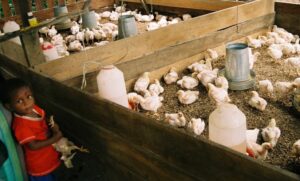
Project: Chicken Exposures and Enteric Pathogens in Children Exposed through Environmental Pathways “ChEEP ChEEP”
Core Investigator(s): Matthew Freeman, Karen Levy
Location: Mozambique
Enteric infections contribute largely to the global burden of diarrheal disease. In low-income settings, domestic and industrial poultry production are ubiquitous. Understanding exposure risk to poultry-associated pathogens may help understand how to best mitigate the considerable health risk that these pathogens present in young children. Identifying these key additional points of exposure represents an important opportunity to design additional targeted interventions. Emory University, in collaboration with Eduardo Mondlane University, will identify critical exposure pathways to children posed by exposure to chicken agriculture in Maputo, Mozambique. To identify these pathways, our multidisciplinary approach will employ field microbiological methods, structured and unstructured observations, surveys, and quantitative microbial risk assessment.
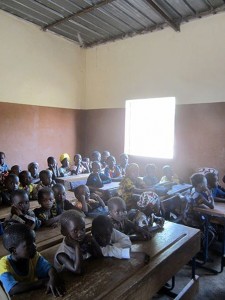
Project: Impact of WASH in Schools on Pupil Absence and Diarrhea
Core Investigator: Matthew Freeman
Location: Mali
The Dubai Cares WASH in Schools Initiative in Mali was a three-year project implemented by a partnership of five international organizations (UNICEF, CARE, Save the Children, WaterAid, Oxfam) and funded by Dubai Cares. The program sought to improve educational and health outcomes in school children through improvements in school WASH infrastructure and management. This initiative was originally operational in 961 schools within six regions of Mali, reaching 12% of the public and community schools in Mali and 18% of the school-aged population. However, the political instability that began in March 2012 resulted in temporary cessation of activities in the northern regions of Timbuktu and Gao and limited the scope of the project to the more southern regions. Emory University collaborated with Dubai Cares and the implementing partners to promote a research and learning agenda alongside the program. The goal of the collaboration was to provide evidence for the link between school WASH and educational attainment as well as health, and also to build local partner capacity in monitoring, evaluation, and learning.
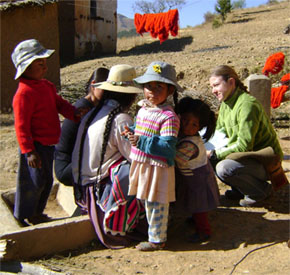 Nutrition and Health in Bolivia
Nutrition and Health in Bolivia
Core Investigator: Juan Leon
Location: Bolivia
The Nutrition and Health project objective is to understand the underlying mechanisms of preventable child illness in Bolivia and other Latin American countries, especially in regards to malnutrition and diarrhea. This is done by building strong partnerships between Emory students and faculty and service organizations dedicated to improving child health. Currently we are assessing 1. Factors associated with malnutrition and diarrhea in a rural and urban Bolivian population and 2. Why diarrhea vaccines fail to prevent illness and death in some children. Our goal is to develop and support interventions that measurably reduce child morbidity and mortality in Bolivia and other Latin American countries due to preventable illness such as diarrhea and malnutrition.
 Human Travel and Diarrhea
Human Travel and Diarrhea
Core Investigator: Karen Levy
Location: Ecuador
In Proyecto EcoZUR (E. coli en Zonas Urbanes y Rurales), the Levy Research Group is using fine-scale genetic data to understand the role that human travel between urban and rural regions plays in determining the distribution of circulating strains of pathogenic E.coli in northern coastal Ecuador. The research approach combines a classic epidemiological case-control study design with whole genome sequencing, phylogenetic analysis, and data on human movement. This project is supported by NIAID, and is being carried out in collaboration with colleagues at Universidad San Francisco de Quito and Universidad Central del Ecuador.
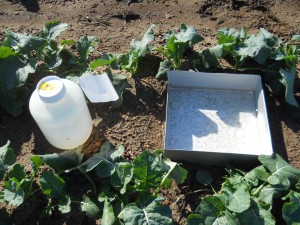 Produce Safety
Produce Safety
Core Investigator: Karen Levy
Location: Southern Georgia
The Levy Research Group is conducting a series of studies of water quality in irrigation ponds in an agricultural area of southern Georgia. The projects aim to develop best practices for detection of Salmonella spp. in the ponds, and to understand the impact of rainfall and land use on microbial water quality of the irrigation ponds and irrigation water. The work has been funded by the Center for Produce Safety and is carried out in collaboration with George Vellidis at University of Georgia and Vincent Hill at CDC.
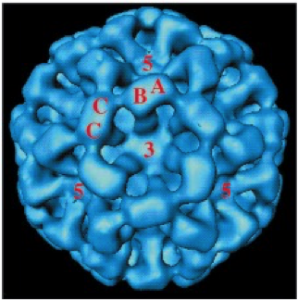 Norovirus prevalence in the US
Norovirus prevalence in the US
Core Investigator: Amy Kirby
Location: USA
The best estimate of norovirus prevalence in the US is an extrapolation from the number of confirmed cases, accounting for factors such as illness rate, probability of seeing a doctor, probability of the doctor collecting a stool sample, etc. Using this method, Scallan et al. estimated that there are approximately 21 million norovirus infections every year in the US. The goal of this study is to estimate the prevalence of norovirus infection using laboratory diagnostics on a nationally representative specimen set. As part of the federally-funded NHANES survey, serum specimens are collected and stored for research purposes. Using an ELISA panel of VLPs representing the most common norovirus gentoypes, NHANES sera will be analyzed for antibodies against seven different norovirus strains. The data will be analyzed using a finite mixture model that accounts for differing immune responses, decaying immunity, and cross-reactivity between strains to produce an estimate of the overall burden of norovirus infection in the US. (Photo credit to Prasad, et al, 1999 Science)